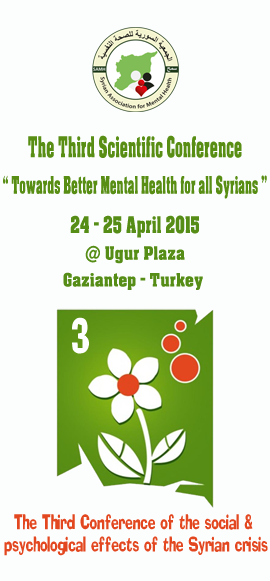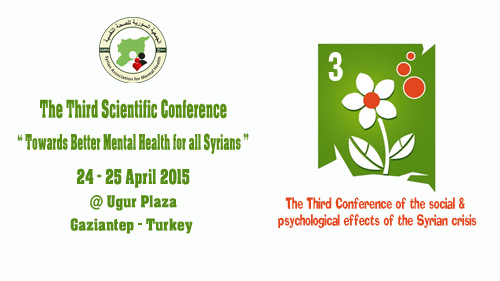

The third annual conference of the Syrian Association for Mental Health (SAMH) was held in Gaziantep, Turkey on 24-25 April 2015. SAMH has several College members who all actively participated the organisation and delivery this conference, with other Syrian expatriate professionals from different countries also involved. The theme for the conference was ‘Towards Better Mental Health for all Syrians’. It was well attended by over a hundred multidisciplinary Syrian professionals including psychiatrists, GPs, psychologists, counsellors and support workers.
14 talks and seminars were delivered as well as 8 extended workshops. The talks included presentations reporting on field work done by some participants and the difficulties they face. The programme also highlighted some innovative approaches to managing problems which had been found to be effective, and more suitable to the local population needs.
The goal was to deliver a programme that is bespoke to the needs of participants, and to focus on practical aspects. A quick ‘needs survey’ had been previously conducted of some teams and attendees to identify priority areas. These were addressed by an accompanying programme that ran for an additional 5 days, before and after the conference.
Almost all participants have worked extensively with Syrian refugees and those internally displaced. They gave valuable accounts of the difficulties they face dealing with the psychological problems on such a wide scale. with little resources. Clearly working in such circumstances of continuous crisis make them over-stretched and in need of support. Although most work in teams, they don't usually have the luxury in terms of case designation based on experience, peer support and the required supervision and reporting. There was therefore a degree of burn-out by almost all field workers due to the overwhelming needs of the affected population and the lack of clear strategy to deal with such demands. Having to face severe cases of complicated trauma, with lack of appropriate resources, adds to the pressure on workers.
The training programme included sessions on dealing with burn-out, self-help skills, psychological first aid, group and play therapy skills, CBT techniques, benefits of EMDR, management of depression, principles of psychiatric assessment, drugs addiction and the use of assessment scales. Role play and extended sessions of Q&A were quite valued by participants as it focused on practical aspects they need in daily basis.
Overall the conference has succeeded in covering some of the needs of field workers and volunteers who are helping affected Syrians. Resources are required to sustain the current efforts and build on them. There still lots to be done to evaluate the psychological consequences of this unprecedented crisis, and find ways of dealing with them both in the short- and long-terms.